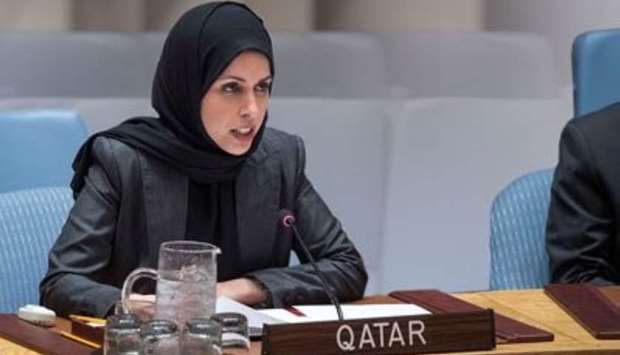Qatar has renewed its support for the jurisdiction of the International Court of Justice (ICJ) in the peaceful settlement of disputes, affirming its commitment to the role played by the court under Article 33 of the United Nations (UN) Charter.
This came in a statement delivered by Qatar’s Permanent Representative to the UN, ambassador HE Sheikha Alya Ahmed bin Saif al-Thani, at a session of the UN General Assembly to discuss the ICJ report.
The ambassador said that over the past two decades, the efforts of Qatar have contributed to the prevention and settlement of numerous conflicts in the region and to the strengthening of international efforts to maintain international peace and security.
The Ambassador added that Qatar's record of going to the court and respecting its decisions is well known, as Qatar carried out, more than two decades ago, the decisions of the court in good faith, stressing the support of Qatar for the jurisdiction of the court to resolve disputes by peaceful means.
In line with this commitment, Qatar continued to use the mechanisms provided by international judicial bodies, particularly ICJ, to settle existing disputes and protect the rights of Qataris, the ambassador added.
In this context, she referred to the lawsuit filed by Qatar before the court against the UAE, concerning the application of the International Convention on the Elimination of All Forms of Racial Discrimination on July 23, 2018.
The ambassador reviewed the provisions of the ICJ order, which states: the reunification of families that include Qataris separated by measures taken by the UAE on June, 5 2017, allow Qatari students affected by the measures taken by the UAE on June 5, 2017 to complete their education in the UAE or to obtain their educational records if they wish to complete their studies elsewhere, and allow Qataris affected by measures taken by the UAE on June 5, 2017 to reach the courts of the UAE and its other judicial bodies.
Ambassador HE Sheikha Alya said that the purpose of the ICJ's order is to protect the interests of Qataris and to avoid infringing on their rights as a result of these discriminatory measures taken by the UAE against Qataris. “It also affirms Qatar's commitment to deal with the crisis and its implications for international peace and security as well as its humanitarian consequences under international law, international and bilateral agreements and international mechanisms for conflict resolution,” she added.
The ambassador noted that the General Assembly's keenness to hold an annual plenary meeting to hear the ICJ president and to give the member states the opportunity to express their comments and renew their support for the court's mandate is a recognition of its crucial role in the peaceful settlement of disputes.
The ambassador added that the states' respect for ICJ's decisions is a test of their commitment to international law and the principles of international law relating to friendly relations and cooperation among States in accordance with the UN Charter.
She warned against the consequences of non-compliance with the Court decisions, saying that it is an internationally wrongful act, a violation of the obligations imposed by international law and a curtailment of international efforts in the maintenance of international peace and security.
The ambassador stressed that the achievement of the purposes and objectives of the international organisation requires adherence to court decisions, and find ways to force states to implement the decisions of the court in good faith as well as emphasise the magnitude of the risk of non-implementation of the court decisions.

